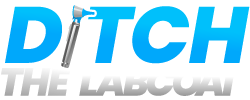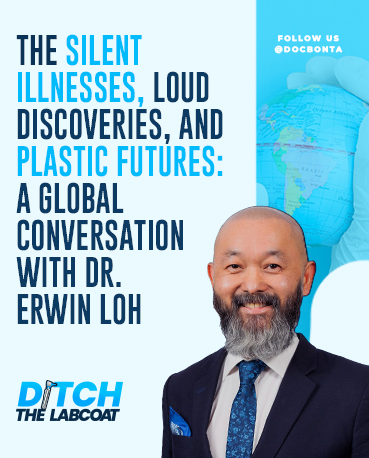It’s not often you meet someone who can confidently explain CRISPR gene-editing, post-viral syndromes, and LinkedIn trolls—all in one conversation. But then again, not everyone is Dr. Erwin Loh. What a treat it was when I randomly reached out to him on LinkedIn, after following many of his interesting posts, to invite him on the show. 2 minutes later: “Sure – Pick a date”.
Erwin is a medical executive, public intellectual, futurist, and possibly the most scientifically grounded optimist I’ve ever had the pleasure of interviewing. Our recent conversation on Ditch the Labcoat spanned hemispheres—he in Australia, me in Canada—but also decades of discovery, from what long COVID has taught us about chronic illness, to how AI and gene-editing could rewrite our species’ destiny.
We began with a sobering question: What happened to all the momentum around long COVID?
Erwin didn’t sugarcoat it. Long COVID is real—and complex. “It’s not just one disease,” he explained. “It’s a constellation.” Post-viral syndromes like this aren’t new—think chronic fatigue after Epstein-Barr or flu—but COVID-19 forced them into the spotlight. And for better or worse, that spotlight is dimming.
He pointed to research showing that most people improve within two years. But for the rest, lingering symptoms like brain fog, fatigue, and shortness of breath are debilitating. The science is evolving: some patients show lung scarring; others show cytokine imbalances or hints of ongoing viral replication—especially in the gut.
Wait—the gut? Cue the microbiome.
We dove into the now-mainstream theory that the trillions of bacteria (and viruses and fungi) living in and on us might influence everything from mood to metabolism. And yes, even long COVID. “We are more bacteria than we are human cells,” Erwin said. “And those microbes release chemicals that act like neurotransmitters.” He explained how gut flora from humans with eating disorders caused disordered eating behaviors in mice. Wild. Terrifying. And fascinating.
The implications? Huge. But the evidence? Early days. As I said in the episode, it’s an area ripe for snake oil—where every probiotic and wellness influencer claim to “optimize your microbiome.” But without a clear recipe, we’re still in the experimental kitchen.
Then we talked CRISPR—the bacterial defense mechanism turned gene-editing tool. Erwin offered a crash course in how scientists hijacked this enzyme system to cut and paste DNA. It’s already been used in sickle cell disease and is being trialed in cancers and HIV. But the future? Even murkier than the microbiome.
Gene-editing presents the most literal kind of power humans have ever had—to rewrite not just lives, but lineages. “Once you start modifying the germline,” Erwin warned, “you’re writing into the human species something that lasts forever.” Cue the ethical dilemmas: Is it treatment or enhancement? Who decides? And how long until the next Bond villain is a gene-hacker?
AI, of course, entered the chat. We both see huge potential in using machine learning to accelerate discovery, interpret complex biological systems, and optimize healthcare delivery. But we also acknowledged the darker side—algorithms trained to build bioweapons, generate deepfakes, or propagate disinformation. “Any tool powerful enough to save lives,” Erwin said, “can be turned into something that ends them.”
We ended with plastics—micro, nano, and maybe even neurological. They’re everywhere: oceans, rainwater, breast milk, brain tissue. Do they harm us? Maybe. Probably. But we don’t know how. Not yet. They might be the asbestos of the 21st century—or just the next misunderstood miracle.
So, are we screwed?
Not according to Erwin. “I’m an optimist,” he said. “But we need technology—and the right attitude—to get through this.” Climate change, pandemics, rising cancers among the young, political inaction—none are unsolvable. But they require courage, clarity, and perhaps the help of non-biological intelligence. AI, robots, and maybe even genetically engineered humans might be the ones who clean up the mess we’ve made.
It’s a heady time to be alive. The pace of discovery is dizzying. But so is the risk of distraction. We can cure rare diseases, but what about curing inequality? We can optimize our gene expression, but can we reduce our emissions?
There are no easy answers. But that’s why voices like Erwin’s matter. In a world that is both thrilling and terrifying, it helps to hear from someone who is smart enough to understand the science—and brave enough to keep sharing it, trolls be damned.
Thanks for reading. If you enjoyed this conversation, check out the full episode of Ditch the Labcoat wherever you get your podcasts. And if you’ve got questions about CRISPR, long COVID, or what happens when you let your microbiome throw a party—drop them in the comments. We’ll be diving deeper in future episodes.
Subscribe to stay curious.

